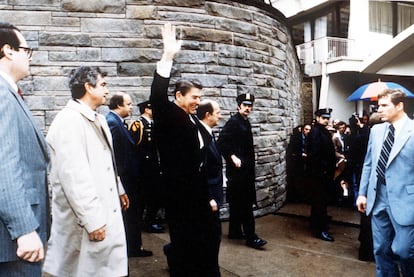A specter is haunting the United States again: the specter of political violence. The assassination on the campus of Utah Valley University of MAGA (Make America Great Again) leader Charlie Kirk, who was shot in the neck while answering—as a defender of the Second Amendment—an awkward question about the gun violence epidemic before an audience of thousands of students, refreshed the sinister memory of a country that has seen four presidents assassinated while in office and that in recent years has witnessed a wave of ideological crimes fueled by the tensions of a deeply polarized society.
Columnist, polarization theorist, and progressive podcaster Ezra Klein recounted on X a few hours after Kirk's death: from the January 6, 2021, assault on the Capitol to the plot to kidnap Gretchen Whitmer months earlier for her lockdown measures as Democratic governor of Michigan; from the hammer attack on Paul Pelosi, husband of then-House Speaker Nancy Pelosi, to the murder of two Minnesota politicians; and from the execution of the CEO of United Healthcare to the two attempts last summer on the life of then-candidate and now President Donald Trump.
“Political violence is contagious, and it's spreading. It's not limited to one side or belief system. It should terrify us all,” Klein added, pointing to the group of those who reacted to the murder by sharing blame for the tense climate between the left and the right.

With a message delivered around 9 p.m. in Washington and recorded in the Oval Office—a setting traditionally reserved for solemn displays of presidential magnanimity—Trump squandered the opportunity to join Klein and those from both sides of the political spectrum who had been calling throughout the afternoon to “tone it down.”
It's a sad routine in today's America: a political figure dies or is attacked, and good wishes follow, seeking to revise the rules of public discourse, with the same (null) effect as those condolence messages that send"thoughts and prayers" to the victims every time a mass murder occurs.
In his speech, which lasted just over four minutes, Trump cited only a few precedents, all of them involving conservative victims. He spoke with a strained expression about the attacks against him, the attacks on immigration agents in recent months, the Mangione case, and the 2017 shooting of about twenty Republican members of Congress, including speaker Steve Scalise. He did so to attack the"radical left," which, he said,"has compared wonderful Americans like Charlie to Nazis and the worst mass murderers and criminals in the world."
“It is time for all Americans and the media to face the fact that violence and murder are the tragic consequence of demonizing those who disagree, day after day, year after year, in the most hateful and despicable way possible,” Trump added. His administration, he promised, “will find each and every one of those who contributed to this atrocity, as well as those who persecute our judges and law enforcement officers. The political violence of the radical left has hurt too many innocent people and claimed too many lives.”
Republican Congresswoman Nancy Mace and billionaire Elon Musk expressed the same opinion. “The left is the party of murder,” Musk wrote on his social network (X). For far-right influencers Steve Bannon, national-populist ideologue; Alex Jones, champion of conspiracies; and Fox News host Jesse Watters, things go even further: Kirk’s murder is proof, according to their respective broadcasts released a few hours after his death, that there is a “war underway” against the MAGA movement.
Democratic Senator Elizabeth Warren responded to those comments by advising that, if it comes to finding those responsible, it would be better to start with “the president of the United States,” with “every meme and every aggressive word he has posted” on his social networks.
Warren, 76, lived through the events between the assassination of John F. Kennedy in 1963 and those of Bobby Kennedy and the Rev. Martin Luther King in 1968. The other three presidents killed are Abraham Lincoln in 1865, killed by a Confederate in a Washington theater, James A. Garfield in 1881, and William McKinley two decades later.

Those years of lead of the 1960s actually continued into the early 1980s, when a man named John Hinckley Jr., hoping to impress actress Jodie Foster, tried to kill Ronald Reagan outside the Hilton Hotel in Washington. For historians, this failed assassination brings to a close one of the most turbulent periods in US history.
Given the intensity with which tragedies, such as the one that shook the country this Wednesday with Kirk's death, continue to unfold, and given the tense climate in Trump's America, perhaps these historians would do well to open a new chapter in the book of political violence in the United States, a chapter that doesn't seem close to closing.

